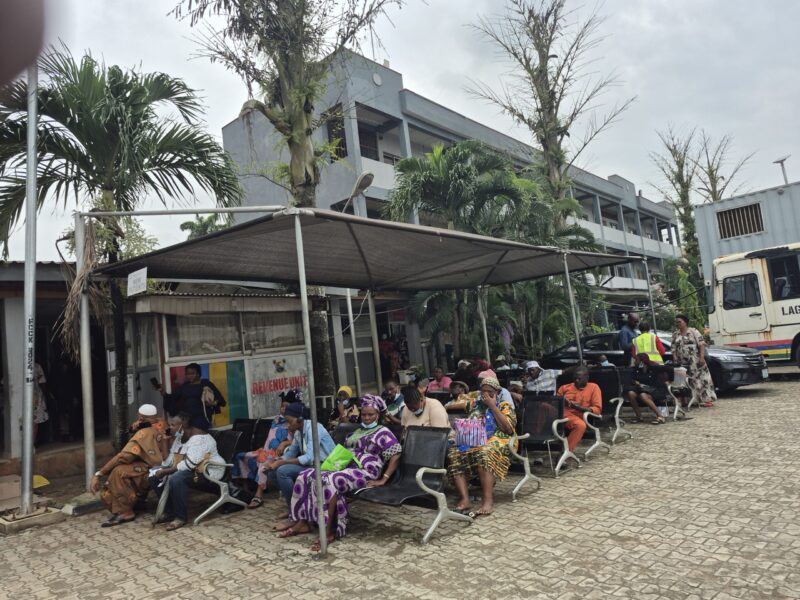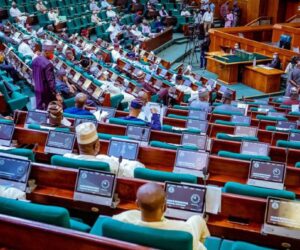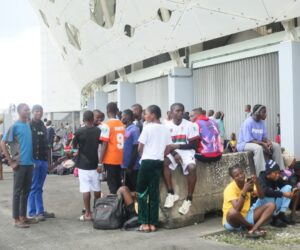Despite the federal government’s appeal and assurances of resolving doctors’ grievances, hospitals across Nigeria are facing widespread disruption as the indefinite strike by the Nigerian Association of Resident Doctors (NARD) entered its third day.
On Monday, visits by PREMIUM TIMES reporters to hospitals in Abuja and Lagos showed that the strike has left many patients stranded, some wards empty, and consulting rooms locked.
While some hospitals’ emergency and critical care units remain functional, most general consultations and clinics have been suspended.
The industrial action began at midnight on Saturday and was declared over due to years of unmet demands and poor working conditions. NARD has vowed to continue the strike until the federal government meet their demands.
Patients stranded in Abuja
At the Kubwa and Gwarimpa General Hospitals in Abuja, the walkways and waiting areas, typically crowded with patients, were nearly empty, except for a few nurses attending to emergencies.
By 10 a.m. at Kubwa General Hospital, only a handful of patients waited at the reception, many unsure if they would be attended to. Nurses and administrative staff could be seen advising patients to “return when the strike is over.”
A mother, Habiba Musa, said she brought her three-year-old son, who had a fever, but was turned back after only basic checks.
“I was told that the doctors are not available, so the nurses only checked his vitals and asked us to come back. They said they can’t prescribe anything without a doctor,” Ms Musa said.
Another patient, Gabriel, who appeared visibly frustrated, said he had waited for over an hour without being attended to. The hospital’s pharmacy was open but minimally staffed.
At Gwarimpa General Hospital, the situation was similar. The Outpatient Department was quiet, and a few patients sat idly while nurses moved between wards explaining the situation.
A pregnant woman who came for her routine antenatal visit said she was told the clinic would not hold.
“They said the doctors are on strike. The nurse just checked my blood pressure and told me to come back next week,” she said.
As she spoke to this reporter, a woman fanned her sleeping daughter in the children’s ward.
“We’ve not seen any doctor since morning. It’s just nurses giving medicine, and with the situation on the ground, I think they are trying their best.”
Hospital officials declined to comment on the development, but the wards were half-filled and activity levels had dropped sharply.
Mixed situation in Lagos
In Lagos, most general hospitals, including Ifako Ijaiye and Alimosho, remained open because most doctors were not NARD members.
However, patients still faced delays at the Maternal and Child Centre (MCC) of the General Hospital, Ifako Ijaiye.
Blessing, a pregnant woman, looked distressed outside the MCC emergency unit.
“I’ve been here since 8 a.m., and it’s past 11. Nobody has attended to me,” she said.
An official at the Lagos State University Teaching Hospital (LASUTH, who requested anonymity, told PREMIUM TIMES that the strike was being closely monitored for compliance but noted that some essential services were still running.
“The ICU and Cardiac Care Unit are working. One cannot yank out ventilators from intubated patients,” the official said.
At Alimosho General Hospital, outpatient activities were busy but strained. By mid-afternoon, more than 180 patients had been registered, though not all were attended to. A health officer told waiting patients to return the next day without stating any reason.
Having waited from 10 a.m. until 2:30 p.m., a young woman who identified herself only as Alhaja, a resident of Iba, was disappointed.
“I was asked to come back tomorrow. I just got the card,” Alhaja said.
As of 2:40 p.m., the hospital had attended to at least 141 persons. Favour Emeka, who came around 9:30 a.m., was the 184th person waiting to be attended to.
Jimoh Aremu, who had gone to the ‘Chest clinic’ area, was attended to and had an X-ray done.
“I was given an appointment. And he (doctor) prescribed some drugs for me,” Mr Aremu said.
In the pediatric ward, a few patients awaited medical attention. An elderly man was also observed entering the emergency section to care for his daughter.
Government insists efforts are ongoing
The strike continued despite the federal government’s recent announcement that it had approved N11.9 billion for paying outstanding arrears, including accoutrement allowance, to doctors and other health workers.
According to a statement by the Federal Ministry of Health and Social Welfare, the payment is part of efforts to address welfare concerns raised by NARD and restore industrial harmony.
The ministry said N10 billion was already paid in August for part of the seven months’ arrears from the 25 to 35% upward salary review. It added that N10.6 billion had also been released for the 2025 Medical Residency Training Fund.
The Minister of State for Health and Social Welfare, Iziaq Salako, said on Monday that the government was addressing each of NARD’s demands and urged the association to return to work while negotiations continue.
Mr Salako also clarified that medical and dental house officers cannot be placed on the civil service scheme because they are temporary staff undergoing one-year internship training.
“It is not possible for them to be seen as regular staff,” he explained. “Would they be enjoying a pension, for example?
“Of course, we cannot put house officers on the pension scheme because they are on training, and that training, which is an intensive one, is for 12 months.”
He added that a committee had been set up to review the dismissal of five resident doctors at the Federal Teaching Hospital, Lokoja.
NARD insists strike continues
But in a new statement signed by its president, Mohammad Suleiman, NARD dismissed the government’s claims of progress, describing them as “fiction detached from reality.”
The association accused the health ministry of misinforming President Bola Tinubu and the public, saying that most of its 19 longstanding demands remain unmet.
These include arrears of allowances, promotion delays, irregularities in salary payments through the Integrated Payroll and Personnel Information System (IPPIS), and poor working conditions.
READ ALSO: NARD Strike: Health minister clarifies civil service status of house officers
“Our struggle transcends money. It is about dignity, safety, and survival,” the statement said. “Industrial peace cannot be achieved through press statements but through justice, sincerity, and respect for agreements.”
NARD also criticised the government’s claim of recruiting 20,000 health workers, challenging the ministry to publish data on how many of them are doctors.
It said the active pool of resident doctors has dropped from about 16,000 a decade ago to fewer than 10,000 today due to poor pay and unsafe work conditions.










